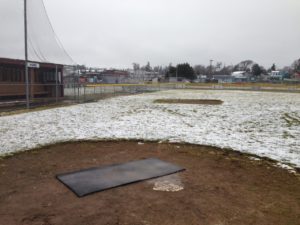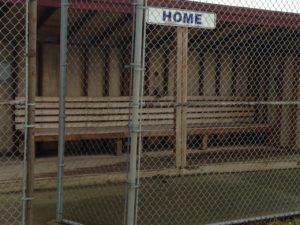
The eyes got me.
They weren’t the first thing we saw. The first thing was a grocery cart, packed with stuff. And a figure hunched alone on a stool, wrapped in layers. And the cardboard sign that turns so many people away.
“Would you give me $5 or a blanket?” is all it said. But the images swirled, angry faces, righteous people. How often has every one of us claimed there shouldn’t be any begging, there’s plenty of help available, dammit there’s free food everywhere you look and what sucker would give these beggars any money when they just buy booze or go off to the casino.
But we needed to talk, a couple old well-fed dudes volunteering for the government, doing the annual Point-in-time Count with a clipboard and a backpack full of fresh socks and granola bars.
When we got close, we looked in her face and saw a neighbor. And we saw those eyes.
“I’ve lived here on Whidbey all my life,” she said, brown eyes twinkling. She told us the year she would have graduated, “except, well… I dropped out.” Somewhere deep, hidden behind her friendly smile, lay the pain and sorrow that brought her through a few decades to this place. But that talk was for another day.
Leann shivered against the chill of a January morning. “People are nice here,” she said, “mostly. Somebody will yell at me to get a job, and I think, ‘man, you don’t know anything about me.’ I mean, maybe they should try walking a mile in my shoes. Sometimes I feel like yelling back. But I’m just not that kind of person.”
Leann works an odd job when she can, but after being evicted and going four years without a home, she injured her back in a car accident and can barely get around to work at all. She uses Obamacare for the injury, takes whatever other help she can find and gets a free meal here and there. She’s on a mile-long waiting list for subsidized housing. And she still sleeps on the street. It seems like she may never get back on her feet again. And meanwhile, “it was so cold last week, I was crying all night.”
Of course she was. It was below twenty degrees and, with no shelter in town, she slept under the awning in an empty store front, hoping she’d wake up in time to move along before someone called the cops.
There’s a warming shelter in Langley, an hour away on the free bus. The same bus that doesn’t run on weekends or late at night.
My well-fed old dude partner and I agreed with her. We’d be crying too. And without saying so, we wondered how long it will be until someone freezes to death here on the streets of our amazing little happy town.
It’s been a cold winter. We asked Leann what she’d say to those that want all the homeless people to go away. To the people who wonder why she doesn’t go find a job in another town, why she doesn’t get off our streets and find somewhere warm. What would she say to the people who think free food just attracts the problem, just makes all these homeless folks come running from somewhere else?
“This is my home. This is where I live, this is where I’m from. I’m doing the best I can. It’s just not enough, and who’s to say it would be any better somewhere else?”
We thanked Leann for her time and headed off to find more neighbors to count.
“Hey? Guys?”
We turned.
“Thanks for the socks.”

It’s cliché to say “there but for the grace of God I go.” But on that day the ghostly line was so evident. One lost job. One missed rent payment. One flat tire. How could that possibly be the end of it all? For the rest of us, we get another job, we scrounge the rent, we fix the tire. We lean on family. We figure it out. But that spiral into the abyss can happen in an instant for our neighbors, and we wonder why.
Where was the family support? Rent a cheaper place! Drive on the spare! Pull yourself up by the…
…what happens when there aren’t any bootstraps left? When the fingers are frostbitten and useless, and they reach in desperation into that void where bootstraps used to be? What happens when it all comes crashing down, the anxiety, the PTSD, the flu or the fight with the spouse or the sexual abuse or the substance abuse or the foolish choices or the medical bills?
When that last piece breaks, whether it’s the rent or the tire or the mental breakdown, there is nothing left.
Around the corner, before we even got deep into the grace of God discussion, we came across Mel. He was on the move, hauling his belongings. I nearly had to run to catch up with him, even as loaded down as he was, excuse me Sir, do you have a minute, and it was a good thing I said it from twenty feet away as he spun on me ready to battle.
This time maybe it was my eyes that got to him. When I smiled and he looked me over, my partner on my heels with the clipboard, he softened. We shook hands all around, right there on the sidewalk next to Highway 20, cars flying wherever they’re going like everything in the world is more important than a guy who walks the street every day without a damn dime to his name.
The first question on the clipboard form is “where did you sleep last night?” so after small talk about the weather we got to that one.
“Nowhere,” Mel replied. “Too nervous. I can’t sleep when I’m nervous.” As he told his story, we caught on to his mental state. Mel wasn’t just bone weary from the cold, from no sleep, from hunger. Mel struggled to speak clearly. He fought his demons, whether they came from stress or mental illness or a controlled substance.
They knew him back at headquarters. Every government op has a headquarters. We came in at noon, shuffling our papers and reporting on the morning count in our section of town. Others came in with us, compiling numbers, covering the entire north half of our island. A year ago, the point in time count found more than 220 homeless people in this pastoral place, a 34% increase over the year before that. We were all on a mission to find our neighbors, talk to them, document their stories, and help the folks at the county seat to understand the problem.
But everyone in the room nodded their heads at Mel’s name. The woman who called herself “the Mother of Oak Harbor” said Mel only sleeps if he has someone he trusts sitting next to him, alert, awake, watching.
“That’s usually me,” she told us. “Sometimes right on the sidewalk, he’ll just lie down and sleep as long as I’m sitting there next to him.”
So it takes a volunteer mom, someone living right out there on the edge herself, to look out for one of our most vulnerable neighbors and give him just a fraction of the comfort the rest of us feel when we lie down in our warm beds at night.
The sun was setting when we went back out. On any other day we’d let our island life slow us down. We’d sit and take it in, the pinks and oranges and blues and purples and even greens crisscrossing the sky in the waning of the light. But this was not another day. Another sweep, another count, another chance to see the spark in the eyes, the wispy hope still alive in the hearts of our town. And another layer of fleece against the dropping mercury.
We found Stan on a curb in front of Safeway. He saw us coming, smiled, waved. “You’re from the Point-in-Time Count? They counted me last year. I didn’t expect to still be on the list. But here I am.”
Last night was in his car, like every other night since he got kicked out of his house, a long story. The car is cold. It’s humiliating. But it’s his.
Last permanent address? “Right over there.” We could almost see the place he’d been living until a little over a year ago. He pointed a finger and repeated the address from memory. “I lived in this town, worked for thirty-five years, got hurt, had to quit my job, got evicted, can barely move with the back injury, can’t work. A guy pulled over last week, asked if I’d come chop a cord of wood for him. I wish. I can’t even pick up an axe.”
Stan doesn’t eat at the all-comers meals in town. “Spin Café? Nope, don’t go there. I guess you call it social anxiety. I can stand here talking to you guys and it’s all good. I get in a group, and it’s like… um…”
He trailed off, this neighbor, this man with a trim beard and a warm coat and a happy smile. This man who lacked the ability to deal with the exact people who were trying to give him a hand up out of the hole he’d fallen into.
 After another pass around darkening streets, we rolled back to HQ at Spin Café during dinner. Free dinner, no questions asked, no forced praying or commitments or bibles. Donate if you can. A couple well-fed dudes, overwhelmed by what’s really happening in our town, turned in our clipboards, turned down the meal, and escaped from the real world. Back to our fragile lives, one misstep away.
After another pass around darkening streets, we rolled back to HQ at Spin Café during dinner. Free dinner, no questions asked, no forced praying or commitments or bibles. Donate if you can. A couple well-fed dudes, overwhelmed by what’s really happening in our town, turned in our clipboards, turned down the meal, and escaped from the real world. Back to our fragile lives, one misstep away.
==================================================
Leann and Mel and Stan are real people. Those aren’t their real names.
Spin Café’s volunteer staff serves meals three nights a week and provides a safe place for a few hours every day for LeAnn and Mel to warm up and make friends. Spin’s name came from the founder’s dream of a laundry service to provide a little dignity to people with no money. Last year they did all that. And they provided 9,000 free meals to the citizens of our happy little town. Spin posts its updates on facebook.
Annual Point In Time Counts are a grass roots effort by local advocacy and government groups. They collect demographic information from people experiencing homelessness, to assess the needs of the community. The result – public and private entities can allocate resources where they’re needed, in ways that benefit the community they serve. Here on Whidbey, our Island County housing officials coordinate the counts with Spin Café in Oak Harbor, South Whidbey Homeless Commission, local churches, and community volunteers.